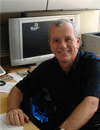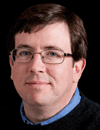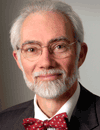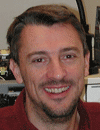David Galbraith
Professor, University of ArizonaDavid Galbraith obtained undergraduate and graduate degrees in Biochemistry from the University of Cambridge, and postdoctoral training as a NATO Fellow at Stanford University. His first academic appointment was at the University of Nebraska Lincoln, and he joined the University of Arizona in 1989 as Professor of Plant Sciences. His research has focused on the development of instrumentation and methods for the analysis of biological cells, organs, and systems. He pioneered the use of flow cytometry and sorting in plants, developing widely-used methods for the analysis of genome size and cell cycle status, and for the production of somatic hybrids. He also was amongst the first to develop methods for the analysis of gene expression within specific cell types, using markers based on Fluorescent Protein expression for flow sorting these cells, and microarray platforms for analysis of their transcriptional activities and protein complements. Current interests include applications of highly parallel platforms for transcript and protein profiling of minimal sample sizes, and for analysis of genetic and epigenetic mechanisms that regulate gene expression during normal development and in diseased states. He has published more than 170 scholarly research articles, holds several patents, and was elected a Fellow of the American Association for Advancement of Science in 2002. |  | | | John Nolan
CEO, Cellarcus Biosciences, Inc.Past President of ISAC. ISEV, ISTH Member. Inventor of Cellarcus’ vesicle analysis technologies. Internationally recognized expert in cytometry and vesicle analysis. |  | | | Paul Robinson
Professor of Biomedical Engineering, Purdue University Cytometry LaboratoriesJ. Paul Robinson is the SVM Professor of Cytomics in the School of Veterinary Medicine and a professor of biomedical engineering in the Weldon School of Biomedical Engineering at Purdue University. He received his Ph.D. in Immunopathology from the University of New South Wales, Sydney, Australia. He completed a postdoctoral fellowship at the University of Michigan Medical School. He is currently the director of the Purdue University Cytometry Laboratories at Purdue University.
He is a past President of the International Society for Advancement of Cytometry, is the Editor- in-Chief of Current Protocols in Cytometry, Associate Editor of Histochemica et Cytobiologica, and Associate Editor of Cytometry Part A. He is an active researcher with over 144 peer reviewed publications, 29 book chapters, has edited 9 books and has given over 120 international lectures and taught advanced courses in over a dozen countries. Robinson was an early adopter of web-based educational materials by publishing the first known published web-based-CDROM in April 1996 and since published 14 CD-ROMs or DVDs with a total distribution of around 100,000 copies all distributed free of charge. He was elected to the College of Fellows, American Institute for Medical & Biological Engineering (AIMBE) in 2004, received the Pfizer Award for Innovative Research in 2004 and the Gamma Sigma Delta Award of Merit Research in 2002. He has participated in numerous NIH, NSF and private foundation review boards. He has given a large number of talks and presentations to student groups and community service organizations.
His research area has been focused on reactive oxygen species primarily in neutrophils and cell lines such as HL-60 cells. His lab is currently focused on mitochondrial function. In addition he is engaged in developing translational tools for better diagnostics for cervical cancer. Over the past several years, his group has expanded their interest in bioengineering with hardware and software groups developing innovative technologies such as the high-speed hyperspectral cytometry, optical tools for quantitative fluorescence measurement and advanced classification approaches for clinical diagnostics and bacterial classification, and high content, high throughput screening technologies Robinson started a not-for-profit charity, “Cytometry for Life” with the goal of providing low cost CD4 technology to those nations most in need of these tools, initially focusing on countries in Africa where over 30 million people suffer from AIDS. The foundation activities include design and manufacture of appropriate low cost CD4 technology, and development of an on-the-ground effort in education and training in AIDS related activities in Africa. http://www.cytometryforlife.org .
The most recent activity was to go to Nepal and climb Mt. Everest. He successfully summited Everest on May 23, 2009, at 9:31am (http://www.cyto.purdue.edu/trackpaul/) in his bid to raise awareness of the major issues facing Africans who are HIV positive. The lack of low cost diagnostic tools has been an important focus of his laboratory activity over recent years.
|  | | | Mario Roederer
Senior Investigator, National Institutes of HealthSorry, There is currently no biography for this presenter. |  | | |
|

 Add to Calendar ▼2013-01-22 00:00:002013-01-23 00:00:00Europe/LondonFlow CytometrySELECTBIOenquiries@selectbiosciences.com
Add to Calendar ▼2013-01-22 00:00:002013-01-23 00:00:00Europe/LondonFlow CytometrySELECTBIOenquiries@selectbiosciences.com